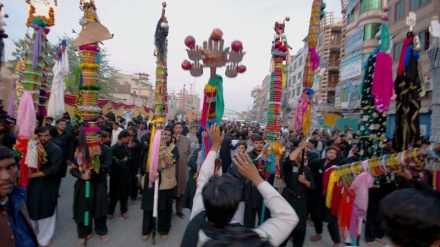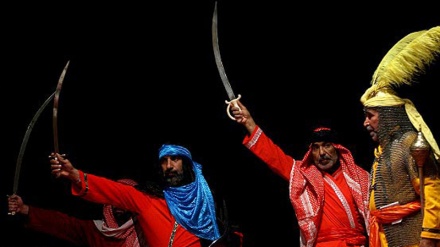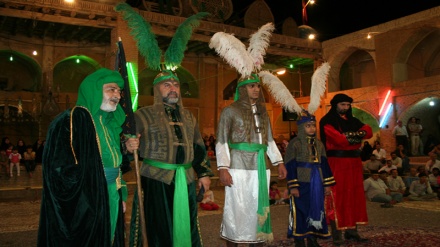Muharram mourning traditions in different lands - 37
In this series, which delves into the mourning traditions associated with the Immortal Epic of Ashura, we have been focusing on the various norms prevalent in different towns and cities of Iran for commemorating the heartrending tragedy of Karbala, after having dwelt on the history of mourning in different countries of the world for Imam Husain (AS).
Today we continue to talk about the tradition of “Nazr”, which means vowing to God to make an offering in the month of Muharram.
Nazr is essentially a pledge or vow to do something or to make an offering. Yesterday we mentioned various types of Nazr which are quite common in the mourning months of Muharram and Safar. But one of the oldest and most common form of Nazr, is when a person promises to feed a gathering of people (for example, feeding the mourners. This is a tradition which goes back hundreds of years among Muslims, particularly the followers of the School of the Prophet’s Ahl al-Bayt or Blessed Household, also known as Shi’ite Muslims. The tradition of offering free food or “Nazri food” to mourners of Imam Husain (AS) is a tradition steeped in Islamic and humanitarian values. In Iran this tradition is well-established, and reaches its culmination on Tasua and Ashura, that is, the 9th and 10th of Muharram. Those who provide Nazri food to the mourners, show their love and devotion to the Chief of Martyrs, Imam Husain (AS) and the other martyrs of Karbala. This wonderful tradition of providing food, also promotes friendship, unity, oneness and cooperation among the mourners. It is a tradition which seems to grow every year, and it is a way of spreading and promoting Islamic values in society.
Three types of Persian dishes (or Persian cuisine) in particular are commonly offered as Nazri Food for mourners in Iran. They are Chelo Khoresht-e Qimeh, Chelo Khoresht-e Qormeh Sabzi, and Adas Polou (which is lentils and rice). Each town or city in Iran has its own tradition of offering Nazri food to mourners in the Months of Muharram and Safar. For example in the city of Kashan a special type of bread, known as “Abbas-Ali Bread” is distributed among the mourners on the day of Tasua or 9th Muharram. Also a form of local cuisine, a delicious meat and beans stew (Gousht Loubia in Persian) is distributed among Muharram mourners in the city of Kashan. In the old days, when people used to keep sheep and cows in their own homes, traditionally cow milk was offered to the mourners of Imam, particularly on 9th and 10th of Muharram, in remembrance of the Imam’s six-month-old infant, “Ali Asghar”, who was cruelly martyred by an arrow shot at his tender neck by the stone-hearted Omayyad marksman, Harmala bin Kahel, when the Imam requested water for the thirsty child. This tradition is very much alive today, and the people of Kashan buy milk from grocery stores and distribute it at processions of mourners on the days of Tasua and Ashura.
In the city of Dezful in southwestern Iran, Muharram mourners are offered refreshing cool drinks, water melon, and ice cream, in those years when Muharram falls in spring or summer, and mourners are offered hot tea or hot milk when Muharram falls in autumn or winter.
In the city of Mashhad in northeastern Iran, in addition to the usual Persian dishes offered to Muharram mourners, a special dish, known as “Sholeh Mashhadi” is cooked and distributed among the mourners.
In the city of Kerman and surrounding towns and villages, a special soup called “Aash-e Ashuri” in Persian is distributed among mourners, from first till seventh of Muharram.
In the city of Hamedan, in addition to the usual food, Halva and Samanou (both types of Iranian sweets) are given to the mourners, as well as dates and milk. Preparation and distribution of free food promotes, egalitarianism, cooperation, unity, oneness, order and balance in society. All sorts of people, from all walks of life, come together and cooperate with one another, in order to prepare Nazri food and distribute it among the mourners of Muharram.
According to a Hadith, also found in the works of our Sunni brethren, when the Prophet informed his Immaculate Daughter, Hazrat Fatemah (SA) of the tragic martyrdom in the distant future of her son in the land called Karbala, she burst into tears as asked "O my father! When would my son be martyred? The Prophet replied: "when neither I nor you, nor Ali would be alive.”
This accentuated her grief and she inquired again, "Who then, O my father, would commemorate Husain’s martyrdom?” The Prophet said, "The men and the women of a particular group of my followers, who will befriend my Ahl al-Bayt, will mourn for Husain and commemorate his martyrdom each year in every century."
AS/MD/SS


